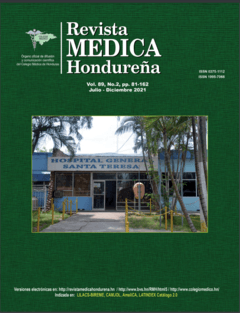Utilización de pautas éticas en investigación por participantes en congreso científico estudiantil internacional, 2015
DOI:
https://doi.org/10.5377/rmh.v89i2.12366Palabras clave:
América Latina, Estudiantes de medicina, Ética en investigación, Investigación, Proyectos de investigaciónResumen
Antecedentes: El cumplimiento de normas éticas contribuye a la protección de los participantes humanos en una investigación. Objetivo: Describir la utilización de la normativa de ética en investigación por expositores de trabajos libres, XXX Congreso Científico Internacional, Federación Latinoamericana de Estudiantes de Medicina (FELSOCEM), Panamá, 2015. Metodología: Estudio descriptivo transversal. Instrumento autoadministrado previo consentimiento informado escrito. Se realizó un muestreo por conveniencia entre participantes inscritos presentando trabajo(s) libre(s). Se consideró cumplimiento de las normas éticas en investigación 1) contar con aval institucional, 2) aprobación de comité de ética en investigación (CEI) y 3) obtención de asentimiento/consentimiento informado. Se registró la información en base de datos EpiInfo vs 3.5.4 (CDC, Atlanta, EUA). El estudio fue aprobado por CEI Facultad de Ciencias Médicas UNAH y FELSOCEM. Resultados: Participaron 98 asistentes, edad promedio 22 años (desviación estándar +2.53), 60 (61.2%) sexo femenino, procedentes de 12 países, 73 (75.2%) con más del 60% de pensum académico alcanzado. Presentaron 105 trabajos libres: 42 (40.0%) casos clínicos, 63 (60.0%) protocolos/trabajos de investigación (44.4% descriptivo, 38.1% analítico, 17.5% experimental). Cumplieron tres criterios éticos de investigación 33 (31.4%), dos criterios 39 (37.1%), un criterio 26 (24.8%), ningún criterio 7 (6.7%). Discusión: El 56.2% (59) de los trabajos presentados no cumplió con las normas éticas en investigación. En época de pandemia, la revisión ética es aún más relevante. Los eventos científicos de asociaciones estudiantiles ofrecen una oportunidad de fortalecer la conducta responsable en investigación en años formativos, lo cual debe ser promovido por el comité organizador de cada congreso.
Descargas
395





